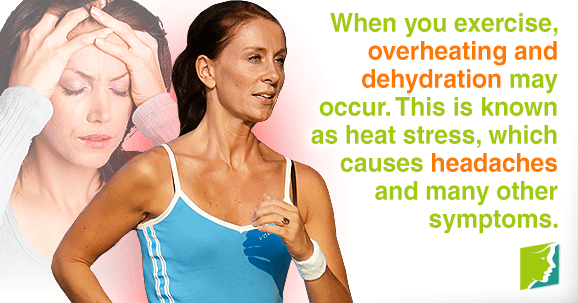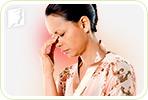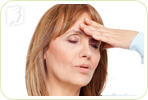The dull, throbbing pain of a headache is, for many people, a familiar one. More than 47% of the American population is affected by headaches, and those between the ages of 25 - 44 are most prone to them. Headaches can range in severity from mild tension in the forehead to debilitating migraines. There are numerous dietary, environmental, and biological factors that contribute to the occurrence of headaches, and it's not uncommon for people to find that, despite being known as a natural headache treatment, going for a run can sometimes bring on a headache.
What Is a Headache?
Though little is understood about what ultimately causes headaches, it is generally accepted that abnormal brain activity disrupts blood flow, causing inflammation of the blood vessels and resultant pressure on the surrounding nerve pathways (i.e., pain). Though this is the ultimate cause, there are a number of other triggers and factors that contribute to the occurrence of headaches, including temperature change, dehydration, high blood pressure, hormonal changes, caffeine withdrawal, alcohol intake, and various medications.
How Does Exercise Help Headaches?
Aerobic exercise is an effective way to combat headaches because it alleviates stress-related headache symptoms, such as muscle tension and anxiety. Exercising for 30 minutes a day at a fairly high intensity (e.g., running, swimming, or cycling), five days a week can significantly reduce the occurrence and intensity of headaches after running on a short and long-term basis.
Why Do I Experience Headaches After Running?
The body functions normally at an internal temperature of 98.6° F (37° C). When you exercise, the blood vessels in the body expand to bring body heat to the surface, and sweat is produced as a response to cool the body down. When sweat does not evaporate at a fast enough rate to keep cool, overheating and dehydration due to excessive loss of body salts and water may occur. This is known as heat stress. Heat stress comes with a number of symptoms, including headaches, deterioration in performance, muscle cramps, nausea, vomiting, and dizziness.
Ways to Avoid Headaches After Running
Heat stress is not a reason to avoid running; the symptoms can be easily prevented. Avoid alcohol 24 hours before a workout, as it dehydrates the body and makes heat stress while exercising more likely. Drink half a liter of fluids during the two hours before going for a run, and try to consume 6.7 ounces (200 mL) of fluids for every 20 minutes of exertion in order to prevent dehydration. It's also a good idea to avoid running during the hottest part of the day and to wear loose, comfortable clothing made from natural fibers when you exercise.
While headaches after running are not a sign of a symptomatic of serious illness (such as a brain tumor), if head pain persists, increases in frequency or intensity, or occurs alongside other troubling symptoms, it is best to consult with a doctor to identify what's causing the headaches and rule out medical concerns. Keeping a written record prior to this appointment, documenting the duration and intensity of headaches and what was eaten and drank 24 hours before the pain began may prove helpful in this, to make diagnosing and treating headaches as efficient as possible.
Sources
- Better Health Channel. (2014). Headaches and hormones. Retrieved May 2, 2014, from http://www.betterhealth.vic.gov.au/bhcv2/bhcarticles.nsf/pages/Headache_and_hormones
- Better Health Channel. (2012). Headaches and stress. Retrieved May 2, 2014, from http://www.betterhealth.vic.gov.au/bhcv2/bhcarticles.nsf/pages/Headache_and_stress ?open
- Better Health Channel. (2014). Heat stress and sports - reducing the risk. Retrieved May 2, 2014, from http://www.betterhealth.vic.gov.au/bhcv2/bhcarticles.nsf/pages/Heat_stress_and_sport_reducing_the_risks?open
- National Health Service UK. (2013). Headaches. Retrieved May 2, 2014, from http://www.nhs.uk/conditions/Headache/Pages/Introduction.aspx
- National Health Service UK. (2013). Hormone headaches. Retrieved May 2, 2014, from http://www.nhs.uk/Livewell/headaches/Pages/Hormonalheadaches.aspx
- National Institutes of Health. (2012). High blood pressure: MedlinePlus Medical Encyclopedia. Retrieved May 2, 2014, from http://www.nlm.nih.gov/medlineplus/ency/article/000468.htm




